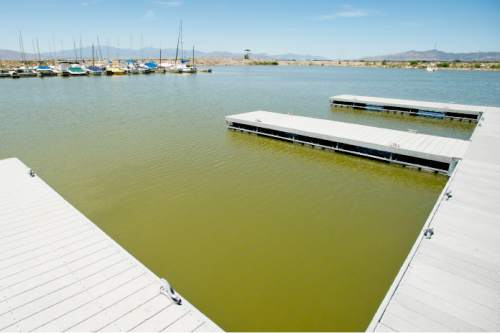This is an archived article that was published on sltrib.com in 2016, and information in the article may be outdated. It is provided only for personal research purposes and may not be reprinted.
More than a half-dozen groups have filed a petition asking the Environmental Protection Agency to revoke Utah's authority to administer portions of the federal Clean Water Act.
In the letter sent Thursday, the environmental coalition, headed by Friends of the Great Salt Lake, says the recent passage of SB110 directly undermines the ability of the Utah Division of Water Quality to enforce the Clean Water Act.
Critics argue that SB110, which became law after the most recent legislative session, was a covert attempt to legalize "pay-for-play" rule-making. It requires the state Division of Water Quality to participate in a controversial peer review process where individuals or entities with water quality permits to challenge the scientific basis of DWQ actions — but only if the challenger is willing and capable of paying all the expenses associated with the review.
In the event of such a challenge, the challenger and the DWQ are to assemble a panel of independent scientists, who will review the action in question — water-quality treatments required under a waste facility's permit, for example — and determine whether it is scientifically sound. Should the panel decide against the DWQ, the state agency is required to cease pursuing that action.
Rob Dubuc, an attorney with Western Resource Advocates, which is representing Friends of the Great Salt lake, called the peer review statute unprecedented and offensive.
According to the petition, the statute violates federal law by creating potential scenarios where the peer review panel could trump federal mandates by restricting the public's access to water-quality decisions and circumventing the judicial system.
The EPA itself has expressed similar concerns, especially on the lack of public participation in the peer review process. In a letter sent to DWQ director Walt Baker on Feb. 1, the EPA's regional water authorities warned that SB110 could put the state in violation of the Clean Water Act.
An EPA spokesman said Thursday that the agency will be reviewing the matter.
The EPA delegates the legal authority to oversee and enforce provisions of the Clean Water Act to Utah's DWQ via what is essentially a contractual partnership. In the event the EPA determines that the DWQ is unwilling or unable to fulfill its responsibilities, the EPA may revoke the DWQ's administrative authority and take over the management of Clean Water Act programs in Utah — including the authority to issue water quality permits.
Only four states do not have delegated authority under the Clean Water Act, Baker said, and one of those — Idaho — is currently seeking delegation.
Baker said he did warn lawmakers during the session that the statute had some "gaps relative to public participation" that had drawn scrutiny from the EPA. He said he hopes that the DWQ will be able to craft administrative rules to fill in the "holes" and appease both the EPA and the environmentalists.
He said he began drafting such rules while the statute was still being discussed, and has already shared them with some stakeholders. He expects to introduce the rules to the state Board of Water Quality next month.
But Duboc said he is skeptical that administrative rules will be able to go far enough to remedy the "fundamental flaws" of SB110.
The environmental groups he represents aren't unhappy with the DWQ, Duboc said, and don't necessarily believe the EPA would be any better at preserving Utah's waters.
"No one wants EPA to come in and take over this program," he said. "EPA doesn't want that, the state doesn't want that, and we don't necessarily want that, but this legislation backs us into a corner. ... One way or the other, this peer review panel has to go away. If that takes the EPA coming in and running the program, so be it."
Twitter; @EmaPen



